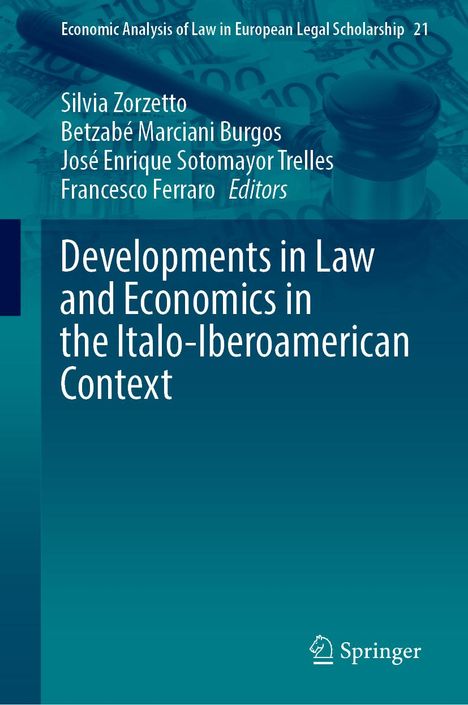Developments in Law and Economics in the Italo-Iberoamerican Context, Gebunden
Developments in Law and Economics in the Italo-Iberoamerican Context
(soweit verfügbar beim Lieferanten)
- Herausgeber:
- Silvia Zorzetto, Betzabé Marciani Burgos, José Enrique Sotomayor Trelles, Francesco Ferraro
- Verlag:
- Springer, 11/2025
- Einband:
- Gebunden
- Sprache:
- Englisch
- ISBN-13:
- 9783032033161
- Artikelnummer:
- 12362508
- Umfang:
- 384 Seiten
- Gewicht:
- 738 g
- Maße:
- 241 x 160 mm
- Stärke:
- 27 mm
- Erscheinungstermin:
- 21.11.2025
- Hinweis
-
Achtung: Artikel ist nicht in deutscher Sprache!
Klappentext
This volume brings together a collection of essays that critically engage with the methodological foundations, historical development, and contemporary applications of Law and Economics across diverse legal systems. Anchored in a comparative and interdisciplinary perspective, the volume reaffirms the enduring relevance of civil law of European origin as a shared legal tradition, while simultaneously scrutinising the promises and limitations of applying economic reasoning to law.
The point of departure is twofold: first, the centrality of legal institutions in shaping social order and in conceptualising law not merely as a set of rules, but as a historically contingent and normatively rich system; second, the imperative to interrogate the philosophical, moral, and political assumptions that underpin economic analysis, often obscured under the guise of methodological neutrality.
Through a dialogue between international scholars, the chapters address both classical and emerging questions. Core themes include the principle of wealth maximisation, the contested legacy of Pareto efficiency, and the image of the legislator as a rational decision-maker. Equally, the volume delves into contemporary concerns, such as behavioural analysis, the normative implications of nudging strategies in criminal law, and the growing influence of evidence-based legal design.
Several essays explore the expressive and symbolic dimensions of law, offering insights into the interaction between legal norms and social meanings---areas where traditional economic models struggle to provide adequate explanatory power. Others examine the legislative process itself through the lens of L&E, engaging with debates on the relative merits of rules versus standards and the cost-benefit calculus in regulatory design.
In addition to theoretical investigations, the volume offers historical and contextual analyses of the reception and evolution of L&E in countries such as Mexico, Peru, Colombia, Chile, Ecuador, Portugal, and Italy. These contributions reveal the contingent trajectories of L&E scholarship outside the Anglo-American mainstream, highlighting both its diffusion and its local reinterpretations.
Taken together, the essays invite a reconsideration of civil law not only as a legal order but as an intellectual heritage capable of engaging critically with economic paradigms---neither uncritically embracing them nor rejecting them in toto, but seeking a deeper integration that remains attentive to legal specificity, normative coherence, and institutional context.


